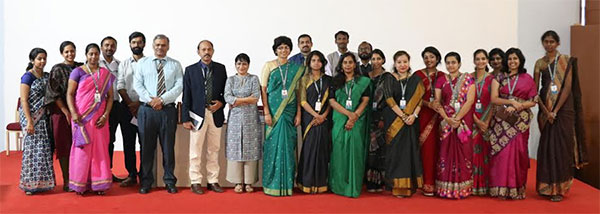Faculty Development Programme
FDP on “Transient Histories - Form (Aesthetics) and Relations (Ecology) in Sustainable Development.”
Date:08 to 15 September 2025
The Department of English, Kristu Jayanti Deemed to be University, organized an International Faculty Development Programme from 8th to 15th September 2025 on the theme “Transient Histories – Form (Aesthetics) and Relations (Ecology) in Sustainable Development.” The sessions featured eminent scholars addressing ecological and cultural dimensions of sustainability. Prof. Mohan J. Dutta (Massey University, New Zealand) explored communication, culture, and planetary justice in the context of sustainable transitions, while Prof. Janet Stephenson (University of Otago, New Zealand) shared insights on sustainability practices and cultural responses. Dr. Avishek Parui (IIT Madras) examined memory, narrative, and environmental imaginaries, and Prof. Murali Sivaramakrishnan (Pondicherry University) discussed art, literature, and ecocritical perspectives. Dr. Rayson K. Alex (BITS Pilani, Goa) highlighted Indigenous ecological knowledge and eco-narratives, followed by Dr. Swarnalatha R (IIT Madras), who reflected on digital ecologies and contemporary climate discourses. The programme concluded with Dr. Anchitha Krishna (NIT Calicut) focusing on environmental humanities and pedagogical approaches. Each session offered fresh perspectives that blended aesthetics and ecology, fostering rich interdisciplinary dialogue. The FDP provided faculty and researchers with valuable insights, collaborative opportunities, and renewed academic energy to address sustainability challenges.
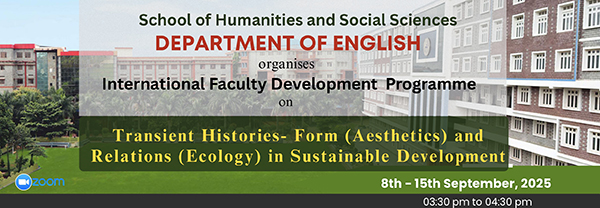
International Faculty Development Programme on “Navigating the Future: Innovations and Strategies in Teaching and Research”
Date:26 Sep to 05 October 2024
The Department of English at Kristu Jayanti College (Autonomous), Bengaluru, organised an International Faculty Development Programme (FDP) titled “Navigating the Future: Innovations and Strategies in Teaching and Research” from 26th September to 5th October, 2024. The objectives of the FDP focused on analysing the impact of a sense of belonging on student learning outcomes, motivation, and engagement. It aimed to equip educators with strategies to foster supportive, inclusive classroom environments by addressing cultural and social factors and integrating these insights into effective teaching pedagogies and practices. There were totally 495 participants benefited by their active participation in all the sessions.
The programme commenced with an inaugural ceremony, where the keynote address was delivered by Dr. Fr. Lijo P. Thomas, Vice Principal and Chief Financial Officer of the college. The ceremony also featured a felicitation by Dr. Zachariah Mathew, Director for Global Engagement at M Flint, who highlighted the global relevance of the programme's theme.
The sessions covered a wide range of topics, addressing the evolving landscape of education and research in the digital age. Prof. Sapna V. Thwaite – Vice Provost for Academic Affairs, Professor of Education, University of Michigan, Flint – led the opening session on the importance of fostering a sense of belonging among students, which enhances their academic performance and overall well-being. Dr. Srividya Sivakumar, a well-known teacher, poet and speaker, discussed sustainable education practices and the role of AI tools in higher education.
Dr. Pramod K. Nayar, FEO, FRHistS, UNESCO Chair in Vulnerability Studies, Department of English, The University of Hyderabad, captivated participants with his exploration of "deep time" literature, linking it to contemporary issues such as the Covid-19 pandemic.
Dr. Nigel Rodenhurst, EAP Instructor from Lancaster University, U.K. addressed the challenges faced by international students in the UK, while Dr. Arjun Ghosh from IIT Delhi introduced computational humanities, simplifying complex concepts for researchers through his session on “Computational Humanities: Counting Words and More”. Prof. Saji Gopinath, Vice Chancellor at Kerala University of Digital Sciences, discussed the ethical implications of AI in a humanities-driven world, and Prof. Sangeetha Menon highlighted the role of humanistic teaching in navigating AI-driven educational spaces.
The FDP concluded with fruitful discussions, emphasizing interdisciplinary collaboration and critical thinking, ensuring that technology serves human needs and values. Each session concluded with an engaging and interactive Q&A segment, where participants actively exchanged ideas, sought clarifications, and delved deeper into the session topics.

International Faculty Development Programme on New Frontiers in Literary Research
Date:09 to 17 October 2023
Kristu Jayanti College (Autonomous), Bengaluru, Department of English organized A Seven-Day International Faculty Development Programme on New Frontiers in Literary Research from 9th October to 17th October, 2023. The FDP focused to equip researchers in exploring diverse genres, themes and encounters ventures into frontiers of research. There were totally 378 participants benefited by their active participation in all the sessions. First day of the FDP began with the inauguration ceremony at 10:00 am. Dr. Lyola Thomas, P.G Coordinator gave the welcome address which was followed by the FDP’s Concept note by Fr. Joshy Mathew, Head, and Department of English. Dr. Fr. Augustin George, Principal, Kristu Jayanti College (Autonomous), Bengaluru addressed the participants with Principal’s Address. Felicitation was graced by Dr. Gopakumar A.V., Dean, and Faculty of Humanities. Dr. Saranya Narayanan extended the vote of thanks on behalf of the hosting community. Last but not the least the inaugural ceremony was mastered by Dr. Saranya Narayanan.
The Resource person of first day was Dr. Gary Lilienthal. He is a professor of Law, NALSAR University of Law, Chairman, Carrington Rand, Hong Kong. He expounded the participants on Critical Literature Review in Action Research which is one of the fundamental areas of research as it helps to enhance the potential to assimilate various perspectives of action research.
The speaker of the second day was Prof. Saibal Debbarma. He is an Author, Poet and Asst. Professor of English at Govt. Degree College, Gandacherra. The topic he touched upon is ‘Healing Modern Anxieties through Lyrical Poetry’.
The speaker of the third day was Dr Priya Chandran who is an Assistant Professor of English at Kannur University, Thalassery, Kerala. The lecture was about the relationship between caste and fear in films.
The speaker of the fourth day was Dr. Prantik Banerjee, professor of English, Hislop College, Nagpur, Maharashtra. He illuminated the participants on a very interesting topic of Petrofiction and current research trends in the area. Researchers and faculty members found it very interesting.
The speaker of the fifth day was Dr. Shalini Chakranarayan. She is an assistant professor of English, at Jazan University, Jizan, Saudi Arabia. She introduced the participants to “Linguistics in Forensic Studies”. She highlighted that forensic linguistics in its broadest sense covers all areas where law and language intersect.
The sixth day of the FDP was on ‘Blue Humanities’ by Dr. C.G. Shyamala. Professor C.G. Shyamala is an Assistant Professor at Mercy College, affiliated with the University of Calicut in Kerala, India. She expounded the participants on Blue Humanities as one of the emerging fields of research vital in an era of climate crisis. Dr Shyamala delivered a compelling lecture on the field of Blue Humanities, shedding light on the emerging trends and showcasing the contributions of various writers to this interdisciplinary domain.
The speaker of the seventh day, was Dr. Shweta Sachdeva Jha. She is Assistant Professor of English, in the Department of English at Miranda House, University of Delhi, New Delhi. She illuminated the participants on Archival Research. The enriching sessions ended with flying colours. The session came to an end with a photo session, followed by the vote of thanks delivered by Dr.Vidyavathi R.
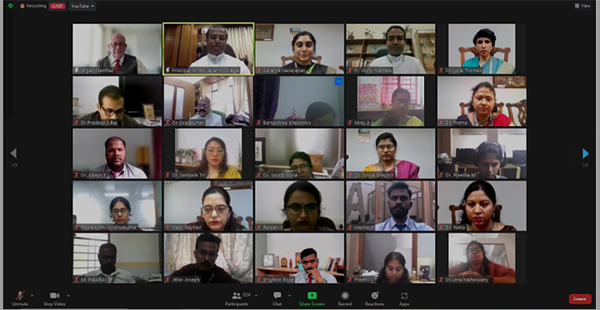
Faculty Enrichment Programme- A Three-Day National Workshop on Research Methodology
Date:06 to 08 September 2023
Department of English organised a Faculty Enrichment Programme- A Three Day National Workshop on Research Methodology for all faculties and academic pursuits on 06th to 08th September 2023 via ZOOM. The resource persons for the sessions were Dr. Rekha Pande, Head of the Centre for Women’s Studies, Professor of History, University of Hyderabad, Professor Emeritus, Henry Martin Institute, International Centre for Research, Interfaith Relations and Reconciliation, Hyderabad, Dr., Joseph Dorairaj, Professor of English, School of English & Foreign Languages, Gandhigram Rural Institute (Deemed to be University), Gandhigram, Tamil Nadu, and Dr. Vijay Solomon, Assistant Professor, Department of Chemistry, Madras Christian College, (Autonomous), Chennai. Rev. Fr. Augustine George, Principal, Kristu Jayanti College, Autonomous, delivered the Inaugural Address and enlightened the participants on the significance of publishing in Indexed Journals in the field of research. The first session began with Dr. Rekha Pande’s talk on “All about Research,” where she pointed out the position of our country in the field of research and talked about the process of increasing the standards to the international level. She elucidated the differences between quantitative and qualitative research and emphasised methods, methodology and epistemology. In the second session (7 Sept 2023), Dr. Joseph Dorairaj spoke on “Research Ethics” and pointed out that academic integrity refers to sound, acceptable and ethical teaching, research and assessment practices. He warned about the consequences of falsifying and tempering with data, plagiarism and self-plagiarism, stealing data from colleagues, sabotaging peer research activity, selectively quoting and misquoting to suit arguments, research misconduct in India, and using the data collected for research without the participant’s knowledge. In the third session (8 Sept 2023), Dr. Vijay Solomon spoke on “From Confusion to Clarity: Journal Selection Tips and Tricks.” He threw light on how to find original journals and fake journals. He differentiated between print, online, open-access and hybrid journals. He elucidated how to calculate a journal’s Cite Score, Impact Factor and Cite Score. He also gave a PowerPoint presentation on identifying the cloned journals.
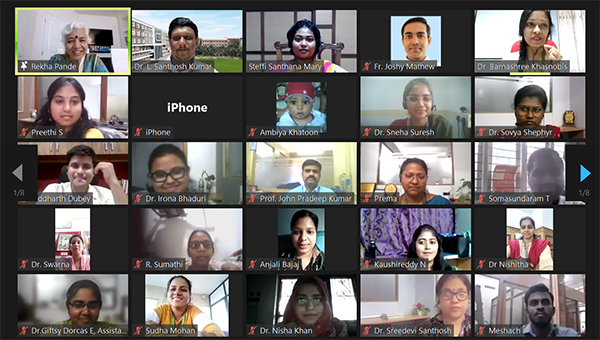
International Faculty Development Programme - Contemporary Trends in English Studies
Date:21 to 28 November 2022
The First day of the International Faculty Development Programme started with the Inaugural ceremony. Prof. Jerrin Jose, UG Programme Coordinator, delivered the welcome address. The Concept note of the International FDP was read by Fr. Joshy Mathew, Head, Department of English. Fr. Dr. Augustine George, Principal, Kristu Jayanti College (Autonomous) delivered the Presidential address. Dr Lyola Thomas, PG Programme Coordinator, proposed the Vote of Thanks.
The day’s speaker was Dr Tonisha Guin, Assistant Professor Indian Institute of Technology, Jodhpur. Ms Alna Maria Isac, Assistant Professor of English, Kristu Jayanti College (Autonomous), introduced the speaker of the day, Dr Tonisha Guin, in her welcome address and invited the participants. Dr Tonisha Guin joined the School of Liberal Arts, IIT Jodhpur, as an Assistant Professor in July 2022. Tonisha Guin’s academic interests are identity studies, space studies, popular culture, decoloniality, knowledge systems in the Global South, and new media studies.
Dr Tonisha Guin, in her lecture, foregrounded the hidden multitudes of identity in the Bengal diaspora and also about Normative. The speaker showcased the Ideologies of Michael Foucault and Derrida on identity discourses. She also emphasized Judith Butler's take on performativity in Politics of Identity.
The lecture was followed by an interactive session where the participants clarified their doubts and asked their questions. A feedback link was provided to the participants, and the session ended with a Vote of Thanks delivered by Dr Saranya Narayanan, Faculty of English.
The second day of the FDP began with a silent prayer. The speaker of the day was Dr. Nadhu Kamra, Professor and Head, Dept. of English, Durga Mahavidhyalaya, Raipur, Chattisgarh. Dr. Arsha Subbi, Assistant Professor of English, Kristu Jayanti College (Autonomous), Bengaluru, introduced the speaker and cordially invited the participants for the session. Initially, the resource person briefed on the framework of what disability studies in the world of academia is. She emphasized on the rise of the disability concepts and provided insights on disability as stigma and how stigma affected people through the component of fear. The concluded the lecture by discussing how this branch is extended to the study of literature. At the end of the session, participants brainstormed the resource person with intellectual questions and feedback links were shared. Vote of Thanks was delivered by Dr. Mary Raymer, Assistant Professor of English, Kristu Jayanti College (Autonomous), Bengaluru.
The Speaker of the day was Dr Avishek Parui (PhD, Durham University) is an Associate Professor in English at IIT Madras and Associate Fellow of the UK Higher Education Academy. Dr Ruth Magdelene, Assistant Professor of English, Kristu Jayanti College (Autonomous), in her welcome address introduced the speaker of the day, Dr Avishek Parui. He is the Principal Investigator of the Centre for Memory Studies and the founding chairperson of the Indian Network for Memory Studies (INMS).
Dr Avishek Parui’s lecture foregrounded the Interdisciplinarity of memory studies, research possibilities and practical possibilities of memory studies. He also quoted the concepts of Astrid Earl, where he talked about the different categories and subcategories of memory studies. In his lecture, he highlighted how literature and literary concepts came first in modern technologies and how memory studies will help to understand them. He concluded by stressing the Importance of Understanding the Complexity of memory and the ontology of memory in post-Digital Age, where memory studies will come as an Intervention for a better understanding of our reality.
The lecture was followed by an interactive session where the participants clarified their doubts and asked their questions. A feedback link was provided to the participants and the session ended with a Vote of Thanks which was delivered by Ms. Minu A, Faculty of English.
The fourth day of the Faculty Development Programme on Contemporary Trends in English Studies began with a silent prayer. Ms. Smitha Mary Sebastian, Assistant Professor, Department of English, invited the participants and introduced the speaker of the day, Dr Shalini M., in her welcome address. Dr. Shalini works as Assistant Professor at the Department of English and Comparative Literature, Central University of Kerala, India.
Dr. Shalini M. delivered a lecture titled, “Fresh Woods and Pastures New:’ Contours of World Literature”, in which she traced the origin of the study of World Literature to Goethe’s Weltliteratur paradigm and the subsequent growth of smaller literary movements that transcend national boundaries such as intercultural comparative studies. She also touched upon several famous figures such as Erich Auerbach, Edward W. Said, and Gayatri Chakraborthy Spiva,k who had conceived of the need for the understanding of world literature to evolve out of its narrow Eurocentric focus. She then explained contemporary developments in the concept of World Literature through the works of Franco Moretti, Pascale Casanova and David Damrosch.
The lecture was followed by an interactive session where the participants clarified their doubts and asked their questions. The session ended with a vote of thanks proposed by Dr Samjaila T.H, Faculty of English.
The fifth day of the Faculty Development Programme on “Contemporary Trends in English Studies” began with a silent prayer. Mrs.Neha Kumari, Assistant Professor, Department of English, invited the participants and introduced the speaker of the day, Ms.Tatjana Jovcheska. Tatjana (Tanya) Jovcheska is an EFL/ESL teacher, educational consultant, and Head of the curriculum at Schola, Vietnam.
Ms.Tatjana Jovcheska delivered the lecture on English as a Second Language where she discussed the different dimensions of how English is taught as a second language during the time of the pandemic and the period thereafter. She also implied on the different language apparatus and modules that aid in the teaching.
The lecture was followed by an interactive question session where the participants clarified their doubts related to the lecture. The session ended with a vote of thanks.
The sixth day of the International Faculty Development Programme on Contemmporary Trends in English Studies began with a welcome speech delivered by Dr. Sneha Suresh, following which she also introduced the speaker for the day, Dr. Rima Bhattacharya. Dr. Rima Bhattacharya is an Assistant Professor at the Indian Institute of Technology, Kharagpur. In her session entitled “Viewing Culinary Traditions in Asian American Literature through the Lens of Memory”, she highlighted the connection of food and memory particularly in the larger American society and how it is perceived by immigrants or the marginalized ethnic groups. The presentation began with general topics like ‘The Nature of Food’, ‘The Nature of Memory’ and then eventually delved into the intensive studies connecting both the concepts and explaining the intersection of food and memory particularly in the Asian American literary culture and society. The lecture was followed by a Q&A session where the participants directly posted their questions regarding the subject, engaging the speaker. The session was closed by a vote of thanks proposed by Dr. Lalmalsawmi Ralte.
The Speaker of the day was Dr Leonor Maria Martinez Serrano Assistant Professor in the Department of English and German Philology at the University of Córdoba, Spain. Her research interests include Canadian Literature, Ecocriticism, American Literature, High Modernism, First Nations, and Oral Literatures, Literary Translation, and Comparative Literature. Dr Giftsy Dorcas, Assistant Professor of English, Kristu Jayanti College (Autonomous), introduced the speaker of the day.
Dr Leonor Maria Martinez Serrano in her lecture explicated the hidden multitudes in the works of Shalan Joudry, a Canadian First Nations poet, podcaster, and oral storyteller, pertaining to the native diaspora and also about Normative. The Ideologies of Shalan Joudry and the detailed elaboration on the meaning of land for the First Nations were told through the story of her landscape and the Mi'kmaw people. She emphasized on the Language and Indigenous identity; the also speaker played audio recordings from a podcast by joudry relating to identity discourses
The lecture was followed by an interactive session where the participants clarified their doubts and asked their questions. Feedback link was provided to the participants and the session ended with Vote of Thanks delivered by Ms Chitra Susan Thampy.
The international FDP organised by the Department of English proved to be fruitful and indeed beneficial to the participants. E certificates were provided to participants who received 85% attendance. The feedback submitted by the participants show that the programme was successful to a greater extent.
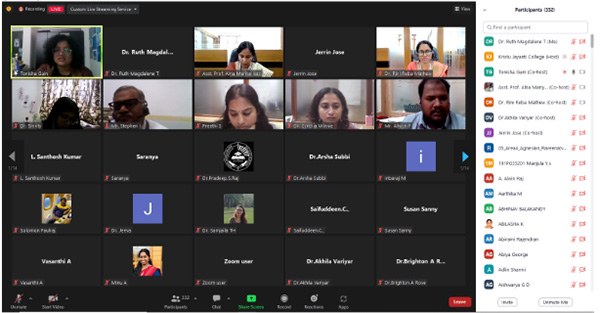
Faculty Enhancement Programme on Technology Driven Pedagogy
Date: 27-07-2022
The Department of English organised a Faculty Enhancement Programme titled 'Technology Driven Pedagogy' on July 27, 2022. Dr. Aruna Devi, Associate Professor, Department of Computer Science (PG), Kristu Jayanti College, Autonomous, Bengaluru, delivered the expert talk.
Dr. Aruna Devi began her session by detailing the technology-assisted teaching pedagogy tools that could enhance the teachers’ effectiveness both within and outside the classroom. She further extended her talk on the technical methods focusing on experiential learning, participatory learning, and employability to enable learner centric model. The zestful session ended with a Q & A. Teachers found the session insightful, comprehensive and effective.
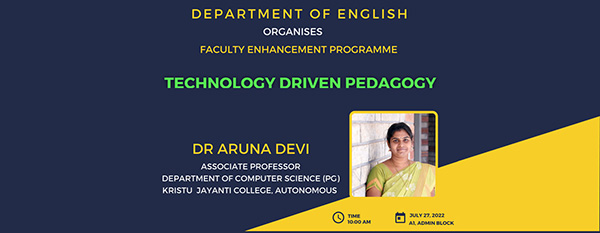
Faculty Development Programme on Research in Literature: Emerging Trends and Approaches
Department of English organised a seven-day Faculty Development Programme on the Topic “Research in Literature: Emerging Trends and Approaches” from 9 -16 August 2021. The resource persons were Dr. V. K Karthika, Assistant Professor, Department of Humanities and Social Sciences, National Institute of Technology (NIT), Trichy, Tamil Nadu; Dr. Tariq Khan, Lecturer cum Junior Research Officer, National Translation Mission, CIIL, Mysore; Dr. Malathy P, Assistant Professor of English, Government Arts College, Coimbatore; Dr. Rajesh Sharma, Professor and Head, Department of English, Punjabi University, Patiala; Prof. C. S. Jayaram
Professor, Department of English, School of Arts and Sciences, Amrita Vishwa Vidya Peetham, Kochi; Dr. Muhammed Afzal. P, Assistant Professor (Cultural Studies), Department of Humanities and Social Sciences, BITS Pilani; and Dr. Milind M Ahire, Assistant Professor, Department of English, Arts, Science & Commerce College, Manmad, Nashik, Maharashtra. The resource persons shared insightful discourses on Research Publication- Scope and Solutions, Literary Studies and Language Sciences in Complementary Roles, Literature and Digital Humanities, Research in Literature: Theory and Interpretation, Art and Literature: New Avenues of Research, Ephemera as Archive: Researching the Popular, and Stylistics: Trends and Possibilities of Research. All the sessions of the FDP tremendously helped the faculty members to get acquainted and updated with new perceptions, awareness, views, and opinions on research in literature.
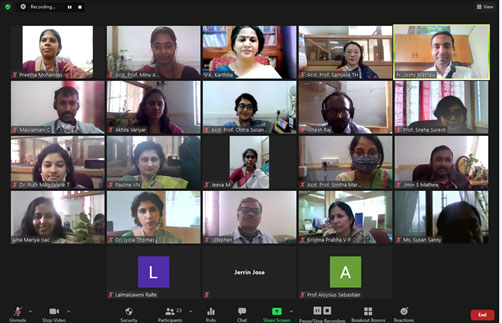
Three-Day Online FDP (26 May-28 May, 2020)
Topic: Changing Faces of English Teaching/Learning in the Post-Pandemic World
Name and Details of the Resource Persons:
Day I: Dr. Dilip P. Barad
Dean, Faculty of Arts, Maharaja Krishnakumarsinhji, Bhavnagar University, Bhavnagar.Gujarat.
Day II: Dr. D. Yogananda Rao
Associate Professor, PG Department of English, School of Humanities & Social Sciences, Jain University, Bengaluru.
Day III: Dr. Amutha Arockiya Mary
Assistant Professor, Department of English, Auxilium College,Vellore. Tamil Nadu
Number of Participants: 158 (131 external participants+ 27 in-house participants)
26 May, 2020, Day I:
Rev. Fr. Josekutty P.D, Principal, Kristu Jayanti College virtually inaugurated the online FDP and delivered the inaugural address. It was followed by introductory remarks by the Head of the Department, Dr. Thomas Palayoor.
The speaker of the day Dr. Dilip P. Barad spoke about the prerequisites at understanding online teaching during the post Covid era. He elaborated on the role of teachers during this period and how the teachers can better understand the difference between ERT (Emergency Remote Teaching) and Online Teaching. He stressed on the objective to provide temporary access to instruction and instructional supports in a manner that is quick to set up and is reliably available during an emergency or crisis. He discussed how one can incorporate technology in the English Literature classroom and about the relevance of visual images in the better understanding of poetry.
He professed the necessity of a paradigm shift in the methods of teaching literature. He also informed the participants about the presence of online poetry generation machines that produce generative literature through the use of algorithm. He concluded by emphasizing that while the literary project for making humans humane is yet not over, the humanities people have new challenges to make robots humane. He thus concluded the session with interactions.
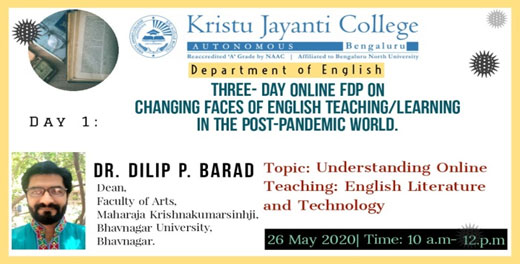
27 May, 2020, Day II:
The speaker of the day Dr. D. Yogananda Rao spoke regarding the developments that took place particularly in the Anglo-phone academia. He attempted to trace the developments by identifying three important points in the trajectory: before theory, theory and after theory. He also elaborated on the change in nomenclature: literary criticism to literary theory and the perception of the function of art and criticism and the orientation of the personnel in the practice of negotiation of texts.
He also stressed that the act of responding to literary texts has been as old a phenomenon as the production of the texts themselves. The responses to texts what has come to be called “literary criticism”. As with writing practices, the critical practices too have not remained static and have undergone several changes over a period of time. Whatever the changes, the focus has not gone beyond the three important components: the author, the text and the reader. He concluded his talk with the reasons that led to the decline of theory. The session ended with interactions.
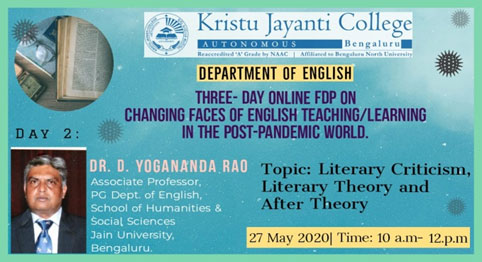
28 May, 2020, Day III:
Dr. Amutha Arockiya Mary addressed the participants regarding the sudden shift to digital teaching and learning that has become the general norm in the Post-Covid period. She stressed on the importance of the visible virtuous teacher to inspire students and who always has the upper hand at being a mentor and motivator to the students. She produced a detailed survey on students’ attitude towards online learning/teaching and highlighted the challenges in the sudden shift to digital learning and digital divide.
She spoke about the necessity of introducing integrated pedagogy with digital devices prioritizing ‘inclusive’ educational strategy. The session was concluded with interactions and feedback session. The FDP came to a close with the concluding comments by the Head of the Department.
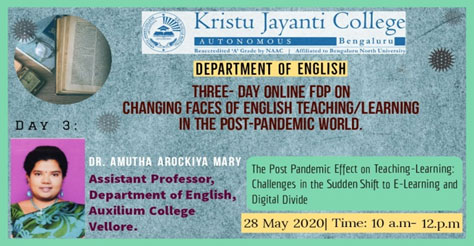
Faculty Development Programme titled “Postcolonial Approach to Literary Texts
The Department of English organized a faculty development programme titled “Postcolonial Approach to Literary Texts” on the 28th of October, 2019. The programme was held at Mini Audi II (Main Block) and faculty members of the English department were in attendance. Professor Alna Maria Isac anchored the session and Professor Jimin S. Mathew introduced the esteemed guest, Dr. Krishna Kumari Manavalli. The session began with the Head of the English Department, Professor Thomas P. welcoming and felicitating the distinguished resource person. Dr. Manavalli has had a long and illustrious career as a literary critic and translator and is currently a Professor and Chairperson of the Department of English at Karnatak University, Darwad. Her riveting lecture addressed various emerging issues in academia, including pedagogy, global teaching practices and the importance of literary theory. The formal talk was preceded by high tea and followed by an interactive session where all members actively participated in a spirited discussion on modern day classrooms and some common problems faced by teachers as well as certain stigma associated with the teaching of theory. At the end of the programme, Dr. Lillykutty Abraham delivered a vote of thanks, expressing the collective gratitude of the department for the stimulating session. The FDP left the faculty members with a better understanding of how to make their lessons more accessible and relatable to their students.
